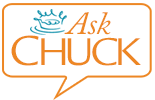Ask Chuck: Should I Use Retirement Savings to Pay Off Debt?
To learn Biblical answers to your financial questions, you can #AskChuck @AskCrown your questions by clicking here. Questions used may be lightly edited for length or clarity.
Dear Chuck,
I'm trying to pay my credit cards off but my income is very limited since I am nearing retirement. I have a 401(k) and a small property that I could sell. What would you recommend: sell the property, keep paying the minimum on the credit cards, or take money out of the 401(k)?
Confused

Dear Confused,
Unfortunately, millions in America are struggling with mounting credit card debt. It can be especially challenging during the retirement years. I don't know how you got in this position, but I sympathize with you. The stress can be overwhelming. That's why all references to borrowing in the Bible are negative. Most are warnings like, "The rich rules over the poor, and the borrower is the slave of the lender." (Proverbs 22:7 ESV)
The good news is you have options! I don't know the full story of your financial picture or what dollar amounts you're dealing with, but I'll give you some basic advice for each of the possible solutions you mentioned, plus some alternative options.
1. Sell the property.
If you have equity to cover the debt on the property and all costs of sale, then this could be a very good option. If this is your primary place of residence then you're going to have to determine where to live and the cost of moving.
2. Pay the minimum on your cards.
This should be your last option. You'll carry the debt for a longer period of time, the interest you pay over time will climb dramatically, and you'll miss out on saving or investing that money. None of these results are pleasant. God's Word warns against staying in debt for long periods of time, because He knows that it restricts our giving capabilities and prevents us from being totally free. Try to avoid this, but if it's your only option for a temporary period of time, it may suffice.
3. Use your 401(k).
Withdrawing a sum to cover your debt sounds like a valid option, depending on your age. However, there are significant costs involved that will require you to take out more than just the credit card debt. There's a penalty for early withdrawal and federal income tax. Plus, the early distribution may push you into a higher tax bracket that will hit you next year at tax time.
Borrowing against your 401(k) is a possibility. But, if you leave your job, the loan must typically be repaid within 60 days. If you get laid off, the amount outstanding is considered early withdrawal and you'll be charged a withdrawal penalty and tax. Ouch!
It may be possible to navigate a different path than those you have proposed. Let's look at some other options:
Aggressively pay down the credit card debt.
I strongly recommend that you use Crown's Debt Snowball Calculator to get rid of all credit card debt. This method will help you get out of debt faster and save money on interest payments.
In addition, consider taking these steps to accelerate your progress:
- Negotiate with the credit card company to get interest dropped by some percentage points. Our trusted partners at Christian Credit Counselors can do this for you.
- Make extra payments to reduce the amount of interest charged and the length of the loan. Check your Debt Snowball Calculator payment plan to see how much time and interest your extra payments will save.
- Transfer the balance to credit cards with lower interest rates. But make sure you pay off the debt before the promotional period ends and rates soar!
- Get a personal loan if you can find an interest rate lower than what you're paying.
Make lifestyle and income adjustments now.
Even though your income is very limited, it may be possible to adjust your standard of living to prepare for retirement. I have traveled the world and seen how people live outside of America. Most of us are just never forced to "think outside the box". But thinking logically, not emotionally, is what you have to do when you get in this kind of bind.
Also consider all the ways you might increase your income. Can you take on a part-time job? Can you sell any possessions? Why not temporarily cut your 401(k) contributions and apply that money to the card each month? Apply any extra income towards the debt.
Look for ways to reduce spending. Stop buying ... period. Cut cable, eating out, costly entertainment, new clothes, travel, and basically anything you don't need for survival (at least until you get your credit cards paid off). You'll soon get creative and find ways to stretch your pennies.
Record each dollar you spend and at the end of the week analyze where that money is going. Create a budget and recruit someone you trust to hold you accountable.
Rather than feeling deprived, I challenge you to find joy in each dollar you refuse to spend. A dollar a day adds up to $365 in one year. Ten dollars a day is $3,650. If you save $10 a day, and earn an extra $10 a day, it adds up to $20 a day, giving you $7,300 in just one year. You start applying that to debt and you'll see remarkable results! Plus, if you establish an emergency fund along the way you won't end up in the same boat again.
Set a target date that you want to have the debt eliminated. Post that goal and record your progress with every single payment. Celebrate with friends or family along the way!
Consider selling the property if you have a mortgage.
It is best to go into retirement without debt of any kind. If the property you own has a mortgage, it may be best to sell it. If it's an investment property and can earn you income through rent or by appreciating in value, it may be best to try to hang on to it. Either way, set a goal to pay off all debt before you exit the fulltime workforce.
I hope you will never end up in this situation again. The sacrifices you make now will impact your future. Ask God to supply your needs and to give you the faith to trust Him in this trial.
As James, the brother of Christ, declared:
"Count it all joy, my brothers, when you meet trials of various kinds,for you know that the testing of your faith produces steadfastness.And let steadfastness have its full effect, that you may be perfect and complete, lacking in nothing." (James 1:2-4 ESV)





























